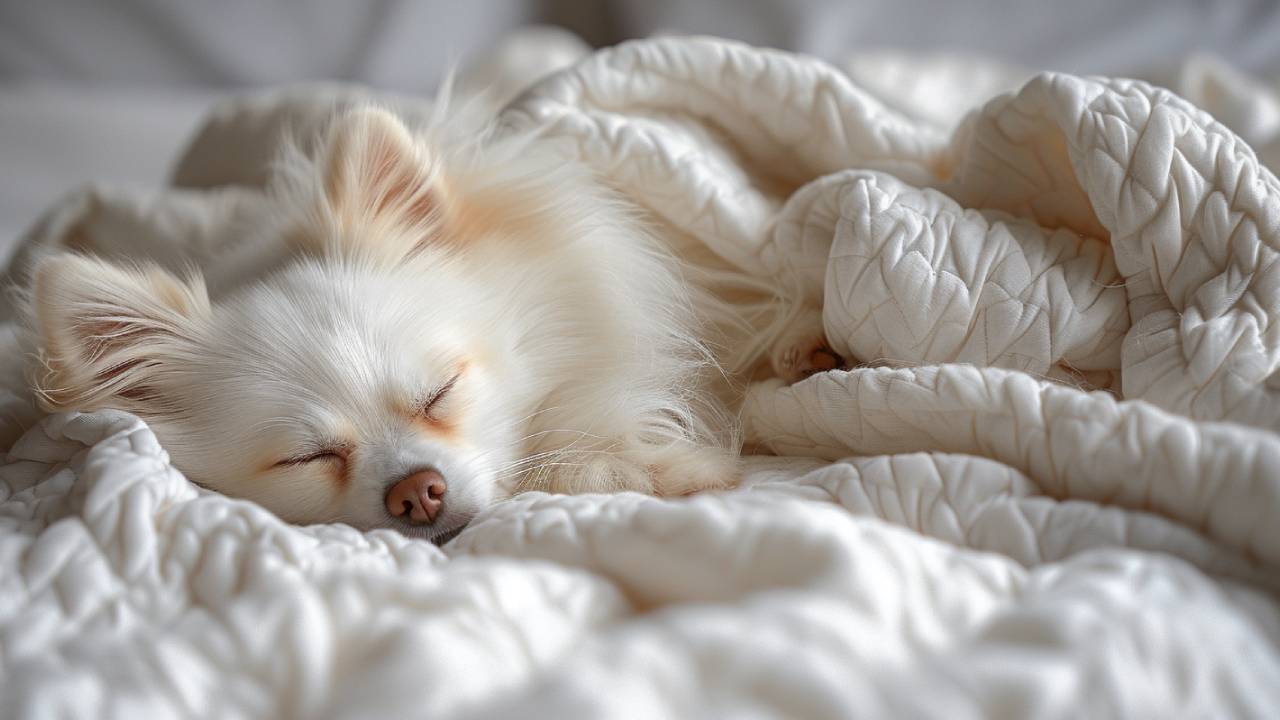Ah, the loyal companions of our lives – dogs. These four-legged friends always amaze us with their boundless energy during playtime and remarkable ability to turn into snoring, sleeping beings at the drop of a hat.
You’re not alone if you’ve ever wondered why adult dogs seem to spend more hours in slumber than engaging in activities. In this article, we’ll explore the intriguing world of canine sleep patterns to understand the reasons behind their seemingly unending need for rest.
Cracking the Slumber Code
Ever noticed how your adult dog appears to doze off at the most unexpected moments? Unlike humans, who generally follow a consolidated sleep schedule, adult dogs have a distinct approach to sleep.
On average, dogs sleep for about 12 to 14 hours each day. Before you gasp in disbelief, remember that dogs march to a different beat when it comes to sleep. They have a polyphasic sleep pattern, dividing their sleep time into multiple short naps throughout the day and night.
Wondering why do dogs sleep on their backs? Read more!
Evolutionary Echoes: Wolves to Woofs
To truly comprehend the rationale behind the excessive sleep of adult dogs, we need to trace their evolutionary lineage.
Modern dogs are descendants of wolves, creatures that had to balance their energy expenditure wisely for survival. As predators and scavengers, wolves needed quick bursts of energy for hunting, followed by extended rest periods for recovery.
This inherent trait has carried forward through generations, manifesting in the sleep habits of contemporary dogs, although their domestication has slightly skewed their activity patterns.

Size, Breed, and Bedtime
When it comes to deciphering the sleep requirements of adult dogs, their breed and size play pivotal roles. Different breeds have been cultivated for herding, guarding, hunting, and companionship. These purposes directly impact their energy levels and, subsequently, their sleep needs.
Smaller breeds, such as the Dachshund or the Chihuahua, tend to have higher metabolic rates, necessitating more sleep to recharge. Conversely, larger breeds like the Great Dane or Saint Bernard have slower metabolisms, which translates to a decreased sleep requirement.
Nurtured by Habitat: Sleep’s Hide-and-Seek
A dog’s living environment significantly influences its sleep duration. Have you ever spotted your adult dog lounging in a patch of sunlight or nestled in a cozy corner? These choices aren’t random; they showcase their acute sensitivity to their surroundings.
Indoor dogs often sleep more than their outdoor counterparts due to the predictability of their environment. Protection from extreme weather conditions and a consistent indoor routine contribute to extended sleep periods.
Sleep as a Mirror to Health
Health is an essential aspect impacting the sleep habits of adult dogs. Sudden shifts in sleep patterns – either excessive sleeping or insomnia-like behavior – can signify underlying health issues. A dog’s sleep disturbances might indicate an underlying problem, from pain and discomfort to medical conditions.
As responsible pet owners, it is crucial to monitor any drastic changes in your adult dog’s sleep behavior, and you should seek guidance from a veterinarian if concerns arise.
Senior Snoozes and Pup Power
Like humans, sleep requirements vary for adult dogs at different life stages. Puppies and senior dogs have distinctive sleep patterns compared to their adult counterparts.
Like human babies, puppies are in a rapid growth and development phase. Their bodies work overtime to shape them into healthy adult dogs, translating to around 18 to 20 hours of sleep daily. On the other hand, senior dogs may also sleep more than their younger counterparts due to age-related ailments such as arthritis or joint discomfort.
Mind Matters: Mental Stimulation’s Role
Adult dogs, it turns out, aren’t only about brawn – their brains have a say too. Mental engagement and stimulation profoundly influence the sleep patterns of adult dogs. Canines that engage in mentally stimulating activities like puzzle toys, interactive games, and training sessions tend to enjoy more restful sleep.
Just as humans can experience sleep disruption due to boredom, dogs too may face similar issues if their mental needs aren’t adequately met.

Caring for Restful Nights
Being responsible pet owners entails ensuring our adult dogs receive the best care, including sufficient high-quality sleep. Creating a comfortable sleeping environment – a cozy bed, optimal room temperature, and minimal disturbances – can significantly impact your dog’s sleep quality.
In addition, maintaining a consistent daily routine, regular exercise, and a balanced diet contribute to overall well-being and healthy sleep patterns.
Discover amazing facts about dogs.
Unraveled: Adult Dogs’ Sleep Enigma
Ever wondered about the extended slumber of adult dogs? Their sleep patterns stem from evolutionary heritage, breed traits, and surroundings. Inherited from wild ancestors, this strategy balances bursts of activity with needed rest. Just as diverse as dogs themselves, sleep needs vary.
Providing mental stimulation, comfy sleep spots, and health care ensures a well-rested furry friend. So, when your dog dozes deeply, remember this innate trait – a nod to ancestral survival tactics.

FAQs
How can I help my adult dog if they’re sleeping excessively?
While adult dogs naturally sleep a lot, sudden changes in sleep patterns might signal health issues. Consult a vet to ensure your furry friend’s well-being.
Can the environment affect my dog’s sleep?
Absolutely. A comfortable and quiet sleep environment, with a cozy bed and appropriate room temperature, can promote better sleep for your dog.
Is there such a thing as too much sleep for an adult dog?
Though adult dogs sleep a lot, excessive sleep combined with lethargy and lack of interest in activities could indicate health problems. Consult your vet if concerned.
How can I mentally stimulate my adult dog to improve their sleep?
Activities like puzzle toys, interactive games, and training sessions can help keep your dog mentally stimulated, leading to better sleep quality.
Can a change in sleep patterns indicate stress in adult dogs?
Indeed, stress and anxiety can impact sleep. Changes in routine, a new environment, or unfamiliar experiences might lead to altered sleep habits. Pay attention to your dog’s behavior.
Do different dog breeds have varying sleep needs?
Yes, breed and size influence sleep requirements. Smaller breeds might need more sleep due to higher metabolic rates, while larger breeds may require less.
How does age affect an adult dog’s sleep pattern?
Age matters. Puppies and senior dogs need more sleep due to growth or age-related discomfort. Adult dogs usually have around 12 to 14 hours of sleep daily.
References
“Study Sets Baseline for Sleep Patterns in Healthy Adult Dogs”: This study by North Carolina State University offers insights into the daily activity peaks and sleep influences by factors like age and weight in adult dogs.
“Sleepovers reduce stress in shelter dogs” – This article discusses a study on how short-term fostering impacts the stress and rest patterns of shelter dogs.






My pup naps all day!